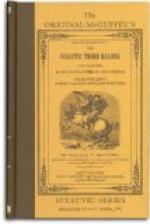10. The captain told one of the men to go aloft and throw down a rope. This was made fast to the boat, and when the sea was somewhat calm it was hoisted, and all fell down into the ship with a dreadful crash. It was a desperate way of getting on board; but fortunately no lives were lost.
11. On the dangerous points along our seacoast are lighthouses, which can be seen far out at sea, and serve as guides to ships. Sometimes the fog is so dense that these lights can not be seen, but most lighthouses have great fog bells or fog horns; some of the latter are made to sound by steam, and can be heard for a long distance. These bells and horns are kept sounding as long as the fog lasts.
12. There are also many life-saving stations along the coast where trained men are ready with lifeboats. “When a ship is driven ashore they at once go to the rescue of those on board, and thus many valuable lives are saved.
13. Take it all in all, a sailor’s life is a very hard one. Our young friends owe a debt of gratitude to those whose home is upon the great waters, and who bring them the luxuries of other countries.
Definitions.—4. Ech’oed, sounded again. Gale, a wind storm. 5. Heaves, pitches up and down. 7. Bil’lows, waves. 10. Des’-per-ate, hopeless. 11. Fog, watery vapor, mist. 13. Grat’i-tude, thankfulness. Lux’u-ries, nice things.
Exercises.—What is this lesson about? When is it dangerous to be at sea? What do sailors then do? In what situation are they most likely to be saved? Relate the story of the man overboard. Tell about the lighthouses. How are vessels warned of danger in a fog? What about the life-saving stations? What is said of a sailor’s life?
XVIII. THE SAILOR’S CONSOLATION. (58)
Charles Dibdin, the author, was born at Southampton, England, in 1745. He wrote a number of fine sea songs. He died in 1814.
1. One night came on a hurricane,
The sea was mountains rolling,
When Barney Buntline turned his
quid,
And said to Billy Bowling:
“A strong norwester’s
blowing, Bill;
Hark! don’t ye hear it roar
now?
Lord help ’em, how I pities
all
Unhappy folks on shore now!
2. “Foolhardy chaps who live in town,
What danger they are all in,
And now are quaking in their beds,
For fear the roof shall fall in;
Poor creatures, how they envy us,
And wish, as I’ve a notion,
For our good luck, in such a storm,
To be upon the ocean.
3. “But as for them who’re out all
day,
On business from their houses,
And late at night are coming home,
To cheer the babes and spouses;
While you and I, Bill, on the deck,
Are comfortably lying,
My eyes! what tiles and chimney
pots
About their heads are flying!
4. “And very often have we heard
How men are killed and undone
By overturns of carriages,
By thieves, and fires in London.
We know what risks all landsmen
run,
From noblemen to tailors;
Then, Bill, let us thank Providence
That you and I are sailors.”




